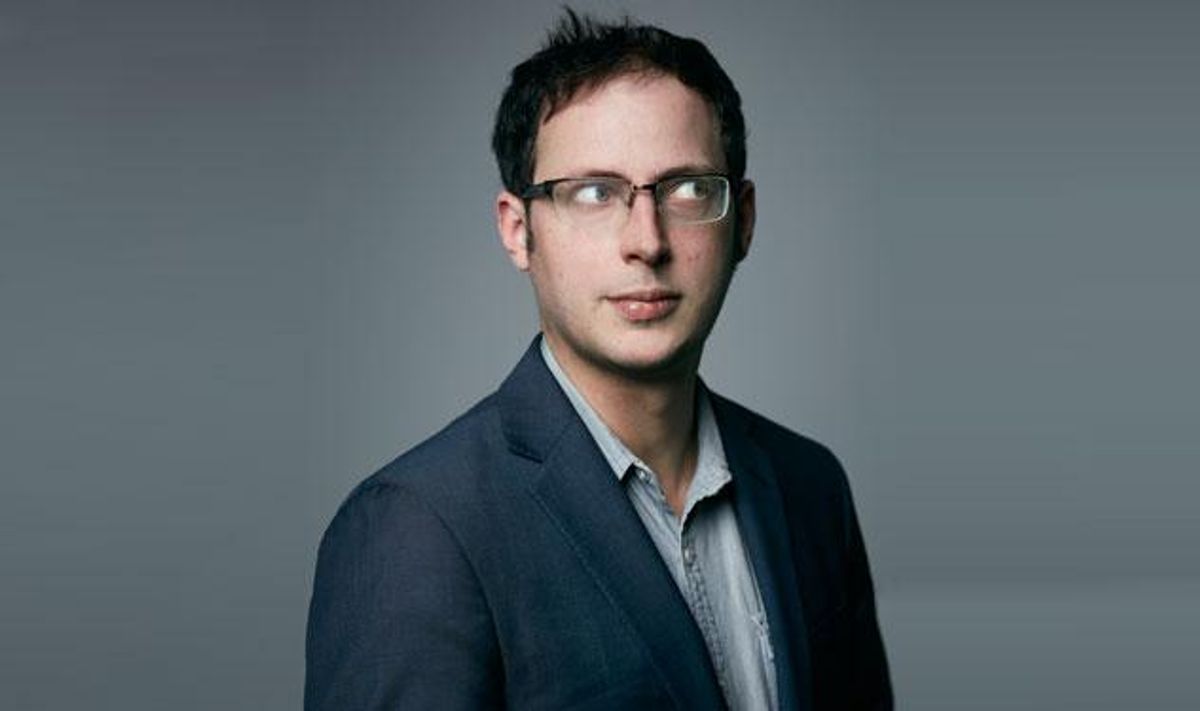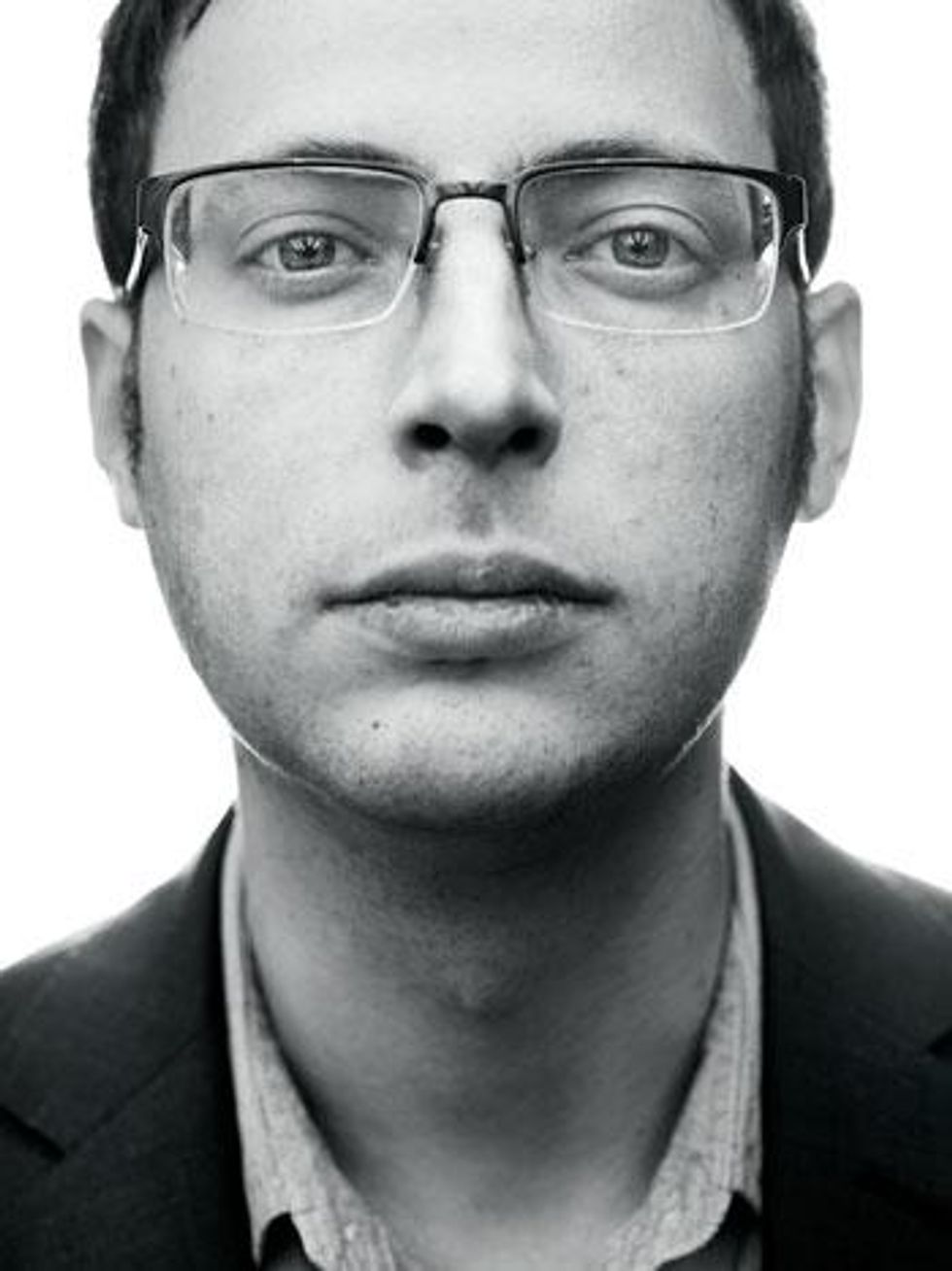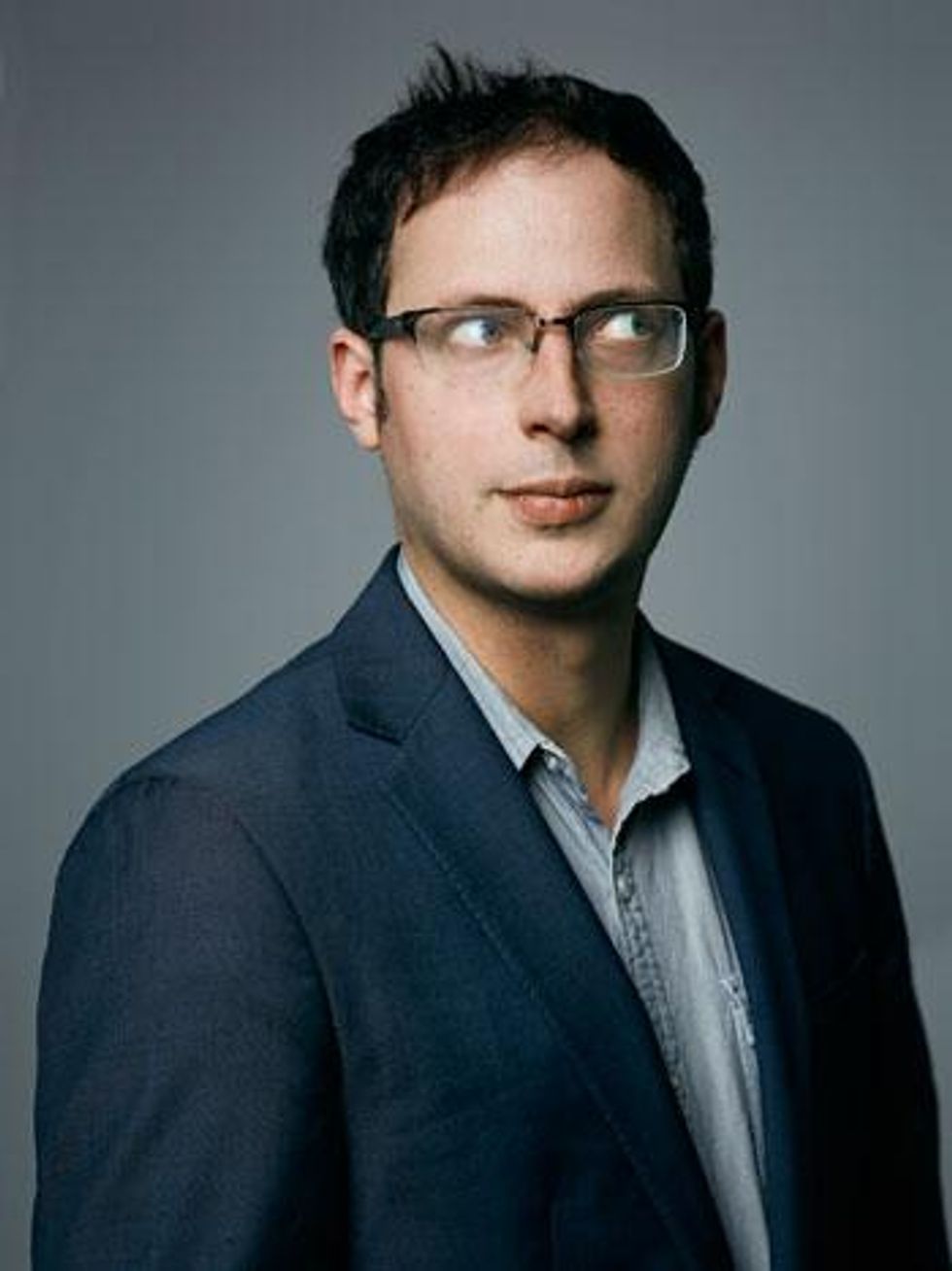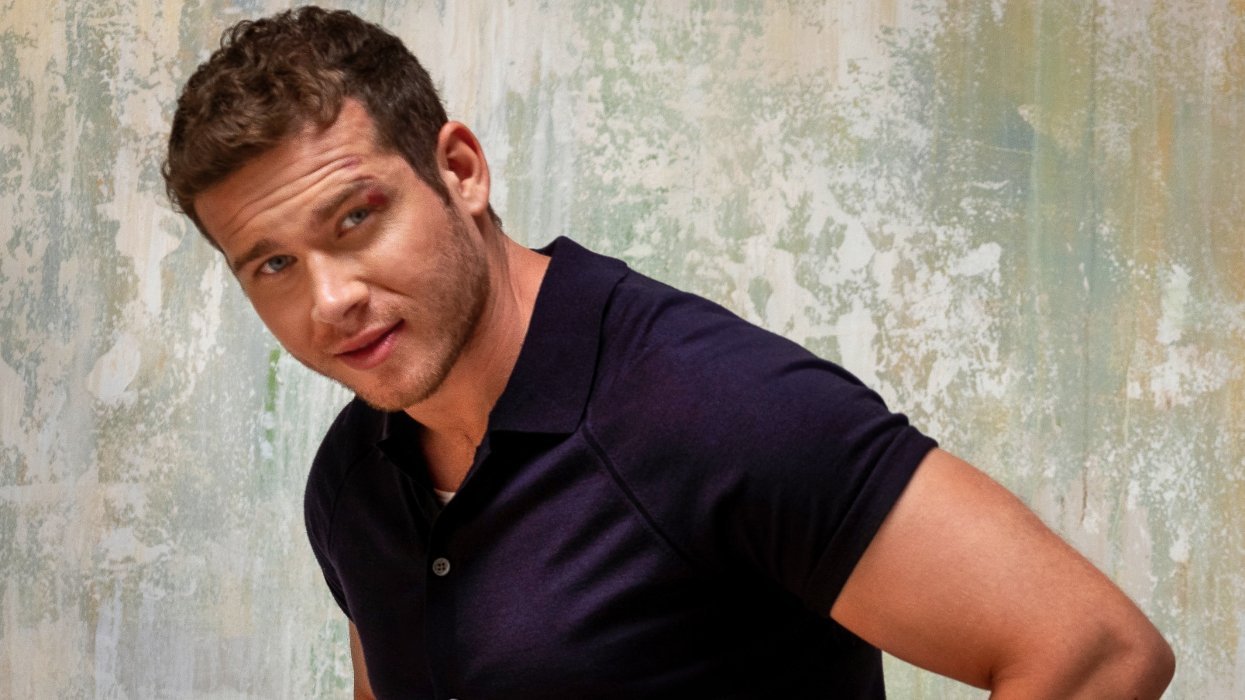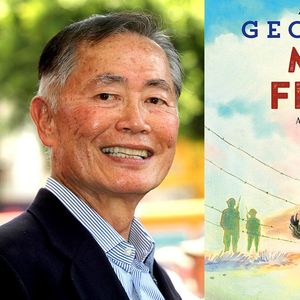
Photography by Mike McGregor
Nate Silver wants to know if I've seen Jiro Dreams of Sushi, the much-praised documentary about Japanese sushi legend Jiro Ono. "It's about this guy in Japan who makes the best sushi, probably in the world, and you're, like, What's the secret?" Silver says. "And the secret is dedication to every little aspect, from the rice to the fish to the way the customers are seated to the order in which the meal is presented." He pauses. "Just dedication to every little aspect of every little thing."
We are in a small restaurant in Brooklyn one Sunday shortly after the election that returned Barack Obama to the White House, and Silver is enjoying the rare prospect of an afternoon watching college football and drinking beer with his friends. "I can't believe it's a Sunday when I actually go and do nothing and not feel guilty about it," he says as a waiter takes his order for a Michelle, a cocktail involving jalapeno-infused tequila, beer, lime, and tomato juice (Silver liked it so much, he had two of them).
Silver's admiration for Jiro Dreams of Sushi, a movie about attention to detail, is of course exactly the kind of metaphor a writer hopes for--an almost too-perfect reveal of Silver's psychology. Fish or numbers, it all comes down to an obsession with method and perfectionism. There is also, of course, the way in which Ono, now in his late eighties, has resisted what, in marketing speak, is described as diluting your brand, an important consideration for Silver, who has been enjoying an unprecedented career high since the election.
"He could have sold out, right?" Silver says. "He could have opened a chain of restaurants and then become a celebrity chef, and he chose not to. He just chose to keep making really good sushi. That's my personality: to really enjoy the work you are doing and not cheapen yourself."
Silver, in other words, has no intention of becoming the Guy Fieri of nerdville. Or, for that matter, to be seduced by the career arc of Malcolm Gladwell, who leveraged his position at The New Yorker into a best-selling franchise of popular science books. (And let's not get started on Jonah Lehrer, another New Yorker writer who stretched himself so thin that he started plagiarizing in order to keep up.) In the highly pressurized world of contemporary media, it's all too easy to see how the demand to produce hits can undermine integrity and discipline.
"It's a bit of a cautionary tale: the bright young intellectual who either gets sloppy or people stop scrutinizing them when they should be critical of everyone and everything," says Silver. "That's why I need to take some time just to relax--between the election and the book, I spilled out a lot of my creative output. Hopefully it's a renewable resource, but you need time to generate thoughts and ideas."
For months in the run-up to the election, Silver, editor of FiveThirtyEight, a blog hosted by The New York Times, had been analyzing the polling data and calmly explaining, to the contempt of pundits on Fox and the gratitude of viewers of MSNBC, why Obama had the election sewn up. His quiet confidence--he bet Joe Scarborough $2,000 that the president would win re-election-- attracted fans and haters alike.
On the eve of the big day, one in five people going to the Times site were going to his blog. But even as the flood broke over their heads, political veterans continued to resist his analysis. There was Karl Rove on polling night, sputtering and spinning on Fox News, insisting it was too soon to call Ohio. There was Wall Street Journal columnist and Reagan speechwriter Peggy Noonan a day before the election, writing of a near-certain Romney surge.
"While everyone is looking at the polls and the storm, Romney's slipping into the presidency," Noonan wrote brashly--and rashly--before taking an obvious dig at Silver. Was it possible, she asked, that we were too busy looking at data on paper "instead of what's in front of us"? The sniff of disdain directed at "data," the idea that these two things--information and common sense--were somehow mutually exclusive was, of course, part of the problem. For Silver, data on paper is the best way to see what's in front of us, so long as we don't allow our biases to get in the way. His best-selling book, The Signal and the Noise: Why So Many Predictions Fail--but Some Don't--less Malcolm Gladwell than Stephen Hawking in its concession to populism--is all about our tendency to filter information through a self-serving lens. Like Caesar refusing to believe the auguries of his death, we hear what we want to hear, with all the attendant consequences. We fail to take the threat of al-Qaeda seriously, for example, or we miss critical signals of an impending economic collapse.
VOTE: Out's Man of the Year Readers' Poll

And too often we let pundits reinforce our convictions with a noisy blend of spin and hokum, whether on climate change or Romney vs. Obama. "Peggy Noonan is someone who is very, very skilled at making bullshit look like some elegant souffle," Silver says. "She's very good at rhetoric and argument, but it's still not grounded in the truth--it all falls apart every four years, but I don't think she'll be out of a job any time soon."
It wasn't just conservatives who spun the election as a close thing. Even Frank Rich, writing in New York magazine, described it as a "down-to-the-wire presidential contest," though at almost no point was Romney in the lead. Among Silver's critics, even on the left, there was palpable anticipation of seeing him exposed as a quack, perhaps because his brand of analysis undermines their buffoonish grandstanding.
Under the headline "One-Term Celebrity," Politico's Dylan Byers scoffed at Silver's analysis, adding tartly, "this may shock the coffeedrinking NPR types of Seattle, San Francisco, and Madison, Wis., [but] more than a few political pundits and reporters, including some of his own colleagues, believe Silver is highly overrated."
The hackneyed characterization of liberals aside, Byers epitomizes, for Silver, the kind of mission creep that is infecting the media. "I think he's a terrible journalist," he says bluntly, referring to an article in which Byers chastised BuzzFeed reporter Michael Hastings for his antagonistic approach to interviewing politicians. "Isn't that the job of a journalist, to speak truth to power? The fact that this Dylan Byers guy saw that as problematic is a problem. We work in a world now where all these connections are so massaged; if you talk to someone in the State Department or the Obama campaign, you have to write three unquestioning fluff pieces for every real piece of information you get." (Byers did not respond to requests for comment.)
Of course, for a gay, half-Jewish geek from Michigan like Silver, the establishment, like the high school clique, is anathema--one you are wise to keep at arm's distance. He's more at home on the outside rattling the cage than on the inside playing with the monkeys. It's why he admires Gawker founder Nick Denton, who threw a party for him in his SoHo apartment after the election. "He's willing to be kind of destructive and path-breaking, and to challenge the status quo; in some ways, it's kind of more my style," he says. (Of Silver, Denton says, "He's not necessarily the best statistician, but he might be the best stats geek who can also write--and perform on television. His steadiness under pundit fire before the election was something to witness.") Although he wasn't excessively bullied, Silver spent most of high school immersed either in fantasy baseball leagues or the debate program. "High school debate is a strange thing," he concedes. "It's very technical--you're not up there giving some type of Abe Lincoln speech, you're reading different types of evidence really fast." He compares his delivery to the old Micro Machines ads, which may explain why he still talks in such a torrent, as well as his enviable ability to apply himself to the task at hand.
"I'm very conservative in some sense because I do believe that hard work is a huge part of the equation," he says. "It's often not sufficient to bring about success, but it's very often necessary if you want to be really good at something. My team won the state title in my junior year, and we were first runners-up in my senior year--had one of the best records in the history of the state of Michigan." He pauses to let this remarkable record sink in before adding, "I probably dedicated 60 hours a week to debate during debate season." This staggering commitment brings to mind Gladwell's thesis in Outliers: that genius is composed in large part of perspiration, or what he calls the "10,000 hour rule," the amount of time, roughly, that you need to practice a specific task to become an expert.
When Silver was not debating, he was playing Scoresheet Baseball with his friend Ray. They applied a kind of Moneyball methodology based on player statistics, and very quickly amassed one of the best teams in the league. Many years later, Silver would channel this passion for baseball into PECOTA, a projection system
that specialized in calculating the prospects of Major League Baseball players (that was then hosted at Baseball Prospectus) and which subsequently inspired his move into politics. And then there was his brief-but-glorious career as an online poker shark, largely as a way to temper the boredom of a consultancy gig with accountancy firm KPMG.
"One of the KPMG buzz words at the time was boundarylessness--it was such a good distillation of a totally meaningless corporate-speak cliche," Silver recalls. "When people ask for career advice, I try not to be specific. I just say, 'Don't let yourself get bored; if you're getting bored, you're probably doing something wrong.' "
Silver eventually quit his day job to focus on cards, making $400,000 in just over two years, before realizing that bad players were a nonrenewable resource. "If you're a bad player, you either become a good player or you go broke, and either way you are no longer available for others to beat," he says. "Once the pond dries up, even the sharks begin to starve." So out of the pond he flopped, and into the sea of analysis he swam.
If these pastimes--poker, baseball, debating Chinese-U.S. relations--seem atypical of the average twentysomething gay guy, perhaps it's because gay nerds have a low profile in our culture. "To my friends, I'm kind of sexually gay but ethnically straight," explains Silver, who came out to his parents after spending a year in London studying economics--"I don't know how I got any work done"--and considers gay conformity as perfidious as straight conformity. He supports marriage equality, but worries that growing acceptance of gays will dent our capacity to question broader injustice.
"For me, I think the most important distinguishing characteristic is that I'm independent-minded," he says. "I'm sure that being gay encouraged the independent-mindedness, but that same independent-mindedness makes me a little bit skeptical of parts of gay culture, I suppose."
He recalls a series of flagpoles in Boystown in Chicago memorializing various gay Americans. "There was one little plaque for Keith Haring, and it was, like, 'Keith Haring, gay American artist, 1962 to 1981,' or whatever [actually 1958 to 1990], and I was like, Why isn't he just an American artist? I don't want to be Nate Silver, gay statistician, any more than I want to be known as a white, half-Jewish statistician who lives in New York."
Silver, who once worked with the dating site OkCupid to calculate the best nights of the week to meet someone for a casual encounter (Wednesdays and Thursdays, apparently--"Friday and Saturday are a clusterfuck"), is not a fan of New York's gay scene, which he thinks is too diffuse, but recalls many fond nights at Berlin, a nightclub in Chicago, where he met his former boyfriend, Robert Gauldin (the two recently separated but remain close; friends are optimistic for a reconciliation). "It was mainly a gay clientele but not entirely--they actually had good house music and good strong drinks, and it was about the right size," he says. "And it's also always the same--if there were a nuclear holocaust, it would live on."
Not that Silver has time for carousing in bars. Since the election, he's been busy with his book tour, juggling pitches for TV shows and documentaries, and working on a new book proposal--"I don't know what yet, but certainly one idea of this election is why do people believe the things they believe; why did people believe Romney was likely to win, in contradiction to the polls?"
Then there's the future of his blog, FiveThirtyEight. Silver's deal with The New York Times runs out next summer, and whether he should stay there or blow it up into a stand-alone site is a question he is still mulling. And, of course, looming over it all is 2016, another opportunity for Silver to assert his dominance in the art of statistical analysis. "I expect 2016 to be spectacular," he says, before running a litany of possibilities, including a Clinton candidacy and a field full of Republican stars that held back in 2012. As for the talking heads and rent-a-mouths, Silver's not banking on any change there. "A lot of this is about values," he says. "I think I have a better value system than the pundits--I care about truth, and I care about informing people, and they care about ratings. So that's where I tend to play offense."
VOTE: Out's Man of the Year Readers' Poll
